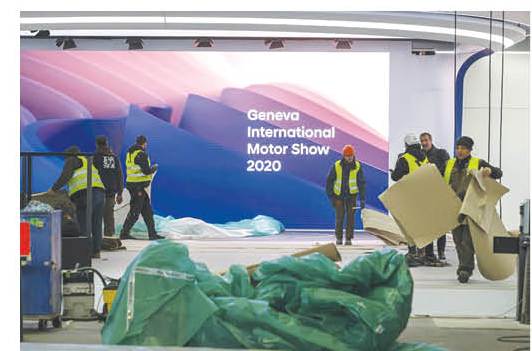Exhibitions go virtual as virus spreads

AP
Frankfurt, Mar : 5 Fine wines and hipster gin. Hunting rifles and knives. Contemporary paintings and million-dollar sports cars. They’re all marketed at trade events that are quickly going dark across the globe due to the new coronavirus - and taking with them sales opportunities that may be difficult to make up.
Some companies are taking their shows online with virtual events they stream from their headquarters to reach customers anyway.
But marketing experts and executives warn that there is no substitute for face-to-face contact with potential clients, as exhibition companies try to total up the losses being suffered by an industry that also pumps billions into hotels, restaurants and cabdriver’s wallets.
The Geneva International Motor Show resorted to putting automakers’ product unveilings and news conferences online Tuesday after this year’s show was cancelled. BMW presented its sleek i4 electric concept car at a digital news conference from Munich, while competitors Daimler and Volkswagen held their own online events.
“It’s not just about purchases. For many products it is also about reinforcing a kind of community building,” said Gernot Gehrke, professor of management and event-industry marketing at the University of Applied Sciences and Arts Hanover.
Trade shows, which can bring sales long after the event, are “a point of contact in a customer journey, if you like, that aims at a stable relationship to customers, and also to people and organizations that might become customers.”
They are also big business. Exhibitors pay in advance to book space and lose their money on such last-minute cancellations caused by health concerns. The Geneva auto show was expected to generate $250 million for the wider city area. “This is a dramatic loss for everyone,” said Oliver Rihs, managing director of the Geneva show, which plans to go ahead next year.
Trade fairs are a tradition in Germany, where some 160 to 180 are held every year, reaping 14.5 billion euros ($16 billion) from visitors and exhibitors and pumping a total of 28 billion euros into the local economy as well as providing 230,000 jobs, 100,000 of them full-time positions. But online showings would be a poor option for the luxury watch industry, which is reeling from the cancellation of two major industry events, Basel world and Watches & Wonders Geneva.
Other big cancellations include the Mobile World Congress last month in Barcelona, Spain, the biggest industry show for wireless technology.
In Chicago, the International Housewares Association this week cancelled its annual show set for mid-March. It was expected to draw more than 56,000 visitors and more than 47,000 nights booked in the city’s hotels.
Leana Salamah, a spokeswoman for the association, said the show was expected to bring $77 million in spending to the city, including on hotels, meals, entertainment and transportation.
A slew of others have been postponed that might be less known to the public but are a big deal in particular industries. This month, the exhibition centre in Duesseldorf, Germany, has alone seen the postponement of fairs for: wine and spirits, metalworking and manufacturing technology, energy storage, and wire and cables.
Recent News

Do not make expressions casting dout on election: EC
14 Apr, 2022
CM Bhatta says may New Year 2079 BS inspire positive thinking
14 Apr, 2022
Three new cases, 44 recoveries in 24 hours
14 Apr, 2022
689 climbers of 84 teams so far acquire permits for climbing various peaks this spring season
14 Apr, 2022
How the rising cost of living crisis is impacting Nepal
14 Apr, 2022
US military confirms an interstellar meteor collided with Earth
14 Apr, 2022
Valneva Covid vaccine approved for use in UK
14 Apr, 2022
Chair Prachanda highlights need of unity among Maoist, Communist forces
14 Apr, 2022
Ranbir Kapoor and Alia Bhatt: Bollywood toasts star couple on wedding
14 Apr, 2022
President Bhandari confers decorations (Photo Feature)
14 Apr, 2022











